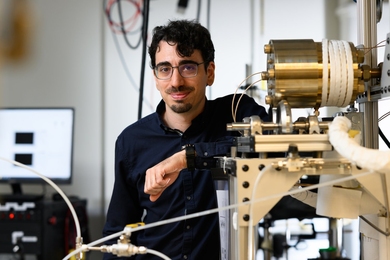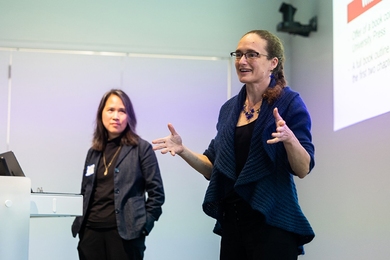This article was originally published in the winter 2004 issue of Spectrum (online at http://web.mit.edu/giving/spectrum) and is reprinted here with permission.
At age 12, Carter Jernigan started his own business.
In sixth grade, he founded The Computer Coach, a company that provides information technology services to individuals and businesses. Now, the 19-year-old freshman from Charleston, S.C., has been in business seven years and has 250 clients, including doctors, lawyers, authors, college professors and philanthropists.
Jernigan makes house calls and will give you a computer lesson or coach you through a trouble spot. He'll help if a computer crashes, design a web site, or advise you what equipment to buy. In fact, no client has ever had a computer problem for which he did not find a solution. "I just tinker until I figure it out," he said.
When he was nine, Jernigan got his first computer. He took it apart, put it together and fiddled with the software. "I wanted to learn everything I could," he said.
He zoomed through MacWorld, PC World, MacUser and Windows magazine. Then, during the summer, he traveled alone to computer camps in Boston and Chicago, where he learned hardware troubleshooting, QBasic programming and web site design. Soon he became an Apple certified desktop technician.
"I'd go to friends' houses, and their parents would realize they could ask me computer questions and I knew the answers," Jernigan said. "Adults would call our house and sheepishly ask to talk to me instead of my parents. Finally, one said, 'Carter, you really need to be charging for this advice!'"
It seemed like a good idea. To begin, he and his mother met with experts from the local office of Service Corps of Retired Executives (SCORE), which offers free advice on how to start a business. After making a business plan, Jernigan took $50 his grandmother gave him for Christmas and bought a business license. Then he went to work.
Often, after he'd replace a defective internal hard drive or crawl under a desk to connect cables for an Ethernet network, a client would offer him milk and cookies. "People would say, 'I just can't believe you're only 12.' Or sometimes people would just laugh. I mean, I guess it is kind of funny."
The son of a doctor and an interior designer, Jernigan ran the business from his bedroom. His mother was his secretary, fielding his calls while he was in school. She also drove him to all his appointments. (One of his clients was his computer teacher, who paid often for his advice.)
"The biggest challenge of running the business has been my age," Jernigan said. "I have the know-how, but sometimes people are skeptical when they see me."
His fee was $10 an hour until one client, the president of a South Carolina bank, "offered me the best advice I ever received--'Raise your fee,'" Jernigan said. "He told me: 'Others doing the same work charge much more. Money conveys value in the world, and if you don't value yourself, no one will. People need to realize that you're serious about your business, and you're more than just some kid who likes computers.'"
Jernigan hiked his fee to $60 an hour, with a one-hour minimum charge. "After that, I'd visit with skeptical clients a couple times, and they'd be referring my name to other people," said Jernigan, who made enough money to pay his MIT tuition but says the biggest payoff of his life was learning his own worth.
At MIT, Jernigan plans to major in electrical engineering and computer science. Maybe one day, he'll work on programming or software development in Silicon Valley, he said. Maybe he'll keep this company or sell it, or maybe he'll start a new one.
Whatever he does, he wants it to be "cutting-edge. I love tinkering with new ideas that are still in development. I'd also like to do something with impact," he said, adding he knows it isn't easy to develop an idea that will revolutionize the world, but still he'd like to try.
Although technical expertise was necessary for his business to grow, he discovered that customer relations is what you really need. "I've learned so much about people--communications skills and social skills. And I've become friends with many clients, who are just as excited as I am about where I might go in life," he said.
One of his favorite clients is an elderly widow whose children bought her a computer for Christmas. "I taught her how to e-mail, use the Internet, take digital pictures and compose letters in Word. Now she's really excited when she e-mails her grandchildren or orders CDs from Amazon.com," Jernigan said.
"I have a lot of fun helping her. It's very gratifying to help people learn something new. To me, success is not about money. Real success is reaching your goals and helping other people along the way."
A version of this article appeared in MIT Tech Talk on March 17, 2004.






